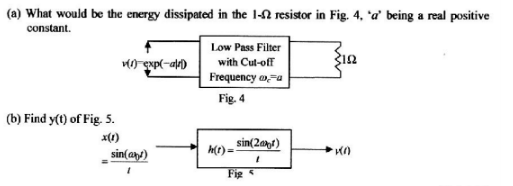I found this question in a previous test paper:
I'm having a few confusions:
Low pass filters are supposed to block signals above a certain frequency. Here that certain frequency is \$w_c=a\$. I'm not sure how to approach this problem. What would be the frequency of \$v(t) = e^{-at}\$? Wolfram Alpha says that the Fourier transform of functions of the form \$e^{-at}\$ do not have any closed form. Also, Fourier series of the signal wouldn't exist since it's not periodic. So, how should I find the energy dissipated in the resistor?
In the second part of the question, what exactly is meant by \$h(t)\$ and \$y(t)\$, any idea?
Please note that I've read the answers to How Fourier transform be able to deal with transients?, but it doesn't really answer my question.

